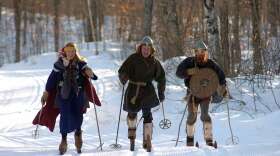With Instant Pots, Wi-Fi connected appliances and endless varieties of yogurt, it can be overwhelming to be a home cook (or even a consumer). But in a time when there's a cooking show, website, or an app for nearly every taste, one media outlet continues to attract people looking for a single reputable source.
America's Test Kitchen is now in its 19th season on public television. But its offerings also encompass cookbooks, magazines, a YouTube channel, apps, a soon-to-be-launched podcast and more. And as its empire has expanded, so has its content.
Today, the TV program is hosted by Bridget Lancaster and Julia Collin Davison, who guide viewers through the show's blend of recipes, tests and food science segments. The idea, the hosts say, is to expand the audience to include nearly anyone who spends time in the kitchen.

"I feel that over the past three or four years, we've made a concerted effort to include foods that aren't just roast chicken," Lancaster laughs. "We will always do roast chicken and we love roast chicken and Julia can talk for two hours about roast chicken, but on top of that, we like to know we're engaging newer viewers.
"Having said that, we do have a reputation as the stalwart in the cooking community. So, people who have known us for 20-25 years, they keep coming back to us."
Lessons Learned
Speaking in between a handful of recent Milwaukee events, the Boston-based hosts offered a few simple lessons — some serious, some tongue-in-cheek — that could help, no matter your level of comfort or experience in the kitchen.
1. Don't bite off more than you can chew
"Small victories add up," says Lancaster. "Say you haven't cooked in the kitchen for a while and you go into the kitchen after 10 years. Start with something small. Start with something that you have a little bit of confidence and work your way up."
She says it's important to learn why things happen, both good and bad. "Once you understand why, you can take that information and really become a better cook."
2. Don't be afraid of failure (usually)
Davison points to her 10-year-old's request for homemade pad thai as evidence that we're all becoming more sophisticated when it comes to our palate. And with that comes the expectation that we'll be more ambitious in the kitchen, which can be hard. But don't fret.
"What happens if your pad thai isn't great? Well, is it edible? And if it's not, you order pizza," she says.
But she concedes there are times you don't want to fall back on pizza delivery. "The stakes aren't high," she says, "unless you have a big piece of meat — a big turkey that's expensive, a prime rib, a tenderloin — when that gets over a certain price point, that's when you don't want to fail, and that's when people really turn to us."
3. Price doesn't equal quality
The America's Test Kitchen team tries out multiple brands and varieties of everything they test — purchasing them the way consumers would from different merchants and with different lot numbers. While sometimes the high-end equipment is the best, that's not always the case. A lot of the time, Davison says the team finds the less expensive products are great. In fact, the team's favorite chef knife isn't fancy and costs $45.
"Just because you want to start cooking and you want to outfit your kitchen, you don't have to spend a lot," she says.
4. Keep your efforts under wraps
"We do have a running joke that we always tell people," Lancaster explains. "Never tell others what you’re making for dinner or any other meal until after you’re done. Because then you can always rename it if it doesn’t work out."
Davison adds with a laugh, "If it’s burnt, it’s Cajun. Blackened."





